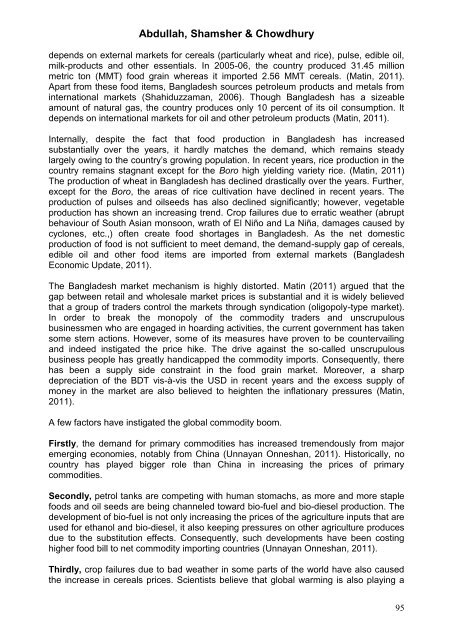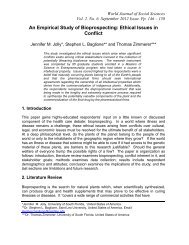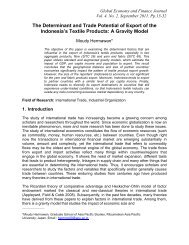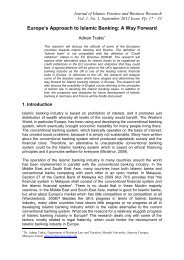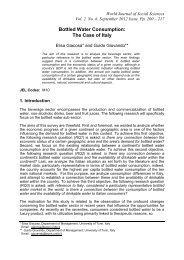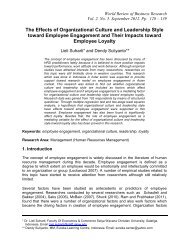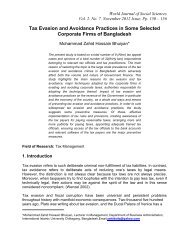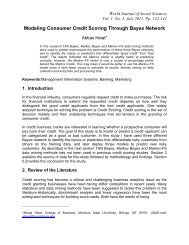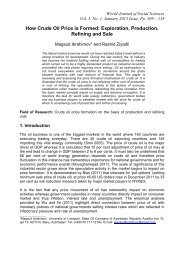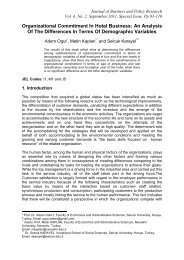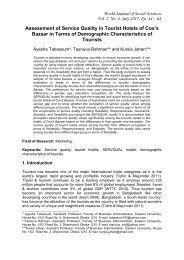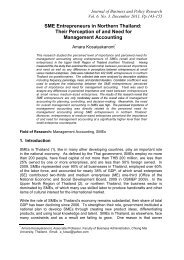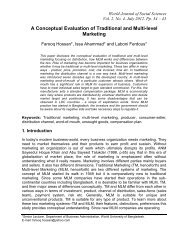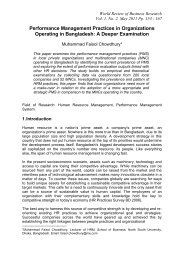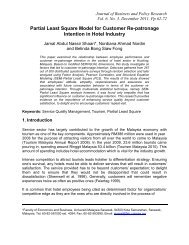Consequences and causes of inflation: A study in the ... - Wbiaus.org
Consequences and causes of inflation: A study in the ... - Wbiaus.org
Consequences and causes of inflation: A study in the ... - Wbiaus.org
You also want an ePaper? Increase the reach of your titles
YUMPU automatically turns print PDFs into web optimized ePapers that Google loves.
Abdullah, Shamsher & Chowdhurydepends on external markets for cereals (particularly wheat <strong>and</strong> rice), pulse, edible oil,milk-products <strong>and</strong> o<strong>the</strong>r essentials. In 2005-06, <strong>the</strong> country produced 31.45 millionmetric ton (MMT) food gra<strong>in</strong> whereas it imported 2.56 MMT cereals. (Mat<strong>in</strong>, 2011).Apart from <strong>the</strong>se food items, Bangladesh sources petroleum products <strong>and</strong> metals from<strong>in</strong>ternational markets (Shahiduzzaman, 2006). Though Bangladesh has a sizeableamount <strong>of</strong> natural gas, <strong>the</strong> country produces only 10 percent <strong>of</strong> its oil consumption. Itdepends on <strong>in</strong>ternational markets for oil <strong>and</strong> o<strong>the</strong>r petroleum products (Mat<strong>in</strong>, 2011).Internally, despite <strong>the</strong> fact that food production <strong>in</strong> Bangladesh has <strong>in</strong>creasedsubstantially over <strong>the</strong> years, it hardly matches <strong>the</strong> dem<strong>and</strong>, which rema<strong>in</strong>s steadylargely ow<strong>in</strong>g to <strong>the</strong> country‟s grow<strong>in</strong>g population. In recent years, rice production <strong>in</strong> <strong>the</strong>country rema<strong>in</strong>s stagnant except for <strong>the</strong> Boro high yield<strong>in</strong>g variety rice. (Mat<strong>in</strong>, 2011)The production <strong>of</strong> wheat <strong>in</strong> Bangladesh has decl<strong>in</strong>ed drastically over <strong>the</strong> years. Fur<strong>the</strong>r,except for <strong>the</strong> Boro, <strong>the</strong> areas <strong>of</strong> rice cultivation have decl<strong>in</strong>ed <strong>in</strong> recent years. Theproduction <strong>of</strong> pulses <strong>and</strong> oilseeds has also decl<strong>in</strong>ed significantly; however, vegetableproduction has shown an <strong>in</strong>creas<strong>in</strong>g trend. Crop failures due to erratic wea<strong>the</strong>r (abruptbehaviour <strong>of</strong> South Asian monsoon, wrath <strong>of</strong> El Niño <strong>and</strong> La Niña, damages caused bycyclones, etc.,) <strong>of</strong>ten create food shortages <strong>in</strong> Bangladesh. As <strong>the</strong> net domesticproduction <strong>of</strong> food is not sufficient to meet dem<strong>and</strong>, <strong>the</strong> dem<strong>and</strong>-supply gap <strong>of</strong> cereals,edible oil <strong>and</strong> o<strong>the</strong>r food items are imported from external markets (BangladeshEconomic Update, 2011).The Bangladesh market mechanism is highly distorted. Mat<strong>in</strong> (2011) argued that <strong>the</strong>gap between retail <strong>and</strong> wholesale market prices is substantial <strong>and</strong> it is widely believedthat a group <strong>of</strong> traders control <strong>the</strong> markets through syndication (oligopoly-type market).In order to break <strong>the</strong> monopoly <strong>of</strong> <strong>the</strong> commodity traders <strong>and</strong> unscrupulousbus<strong>in</strong>essmen who are engaged <strong>in</strong> hoard<strong>in</strong>g activities, <strong>the</strong> current government has takensome stern actions. However, some <strong>of</strong> its measures have proven to be countervail<strong>in</strong>g<strong>and</strong> <strong>in</strong>deed <strong>in</strong>stigated <strong>the</strong> price hike. The drive aga<strong>in</strong>st <strong>the</strong> so-called unscrupulousbus<strong>in</strong>ess people has greatly h<strong>and</strong>icapped <strong>the</strong> commodity imports. Consequently, <strong>the</strong>rehas been a supply side constra<strong>in</strong>t <strong>in</strong> <strong>the</strong> food gra<strong>in</strong> market. Moreover, a sharpdepreciation <strong>of</strong> <strong>the</strong> BDT vis-à-vis <strong>the</strong> USD <strong>in</strong> recent years <strong>and</strong> <strong>the</strong> excess supply <strong>of</strong>money <strong>in</strong> <strong>the</strong> market are also believed to heighten <strong>the</strong> <strong><strong>in</strong>flation</strong>ary pressures (Mat<strong>in</strong>,2011).A few factors have <strong>in</strong>stigated <strong>the</strong> global commodity boom.Firstly, <strong>the</strong> dem<strong>and</strong> for primary commodities has <strong>in</strong>creased tremendously from majoremerg<strong>in</strong>g economies, notably from Ch<strong>in</strong>a (Unnayan Onneshan, 2011). Historically, nocountry has played bigger role than Ch<strong>in</strong>a <strong>in</strong> <strong>in</strong>creas<strong>in</strong>g <strong>the</strong> prices <strong>of</strong> primarycommodities.Secondly, petrol tanks are compet<strong>in</strong>g with human stomachs, as more <strong>and</strong> more staplefoods <strong>and</strong> oil seeds are be<strong>in</strong>g channeled toward bio-fuel <strong>and</strong> bio-diesel production. Thedevelopment <strong>of</strong> bio-fuel is not only <strong>in</strong>creas<strong>in</strong>g <strong>the</strong> prices <strong>of</strong> <strong>the</strong> agriculture <strong>in</strong>puts that areused for ethanol <strong>and</strong> bio-diesel, it also keep<strong>in</strong>g pressures on o<strong>the</strong>r agriculture producesdue to <strong>the</strong> substitution effects. Consequently, such developments have been cost<strong>in</strong>ghigher food bill to net commodity import<strong>in</strong>g countries (Unnayan Onneshan, 2011).Thirdly, crop failures due to bad wea<strong>the</strong>r <strong>in</strong> some parts <strong>of</strong> <strong>the</strong> world have also caused<strong>the</strong> <strong>in</strong>crease <strong>in</strong> cereals prices. Scientists believe that global warm<strong>in</strong>g is also play<strong>in</strong>g a95


